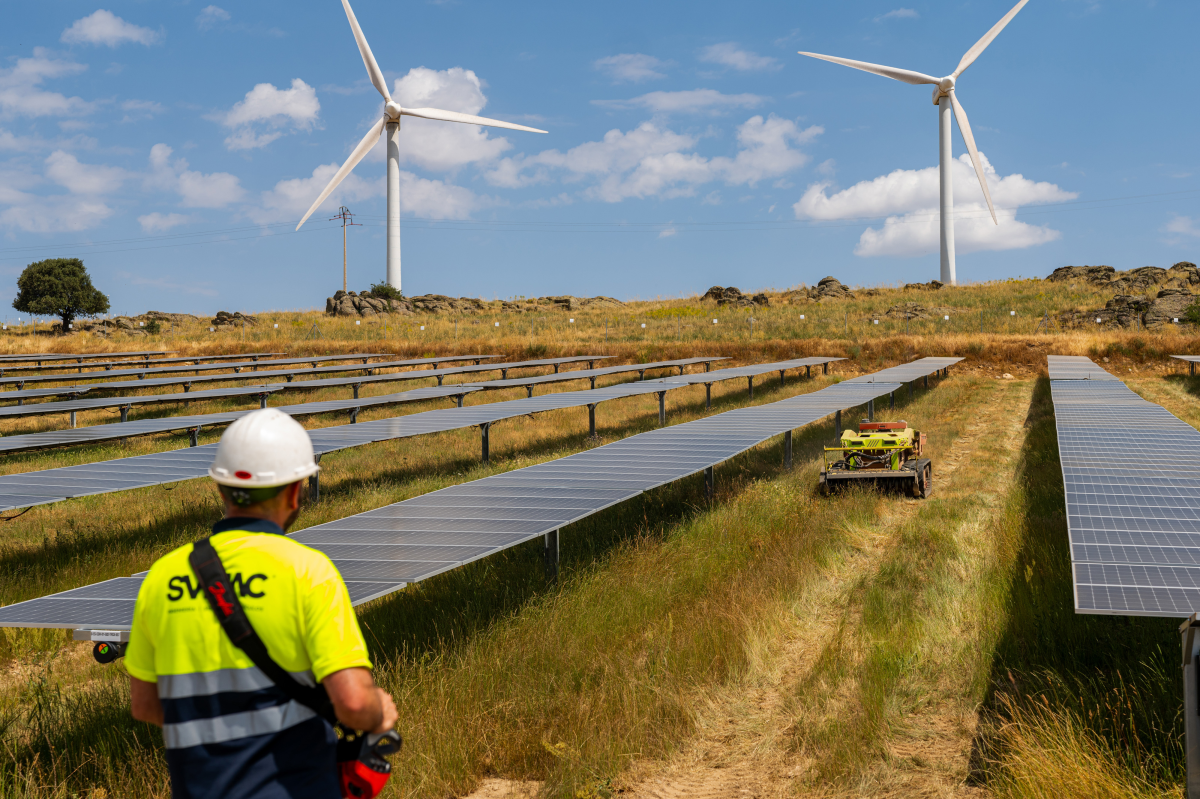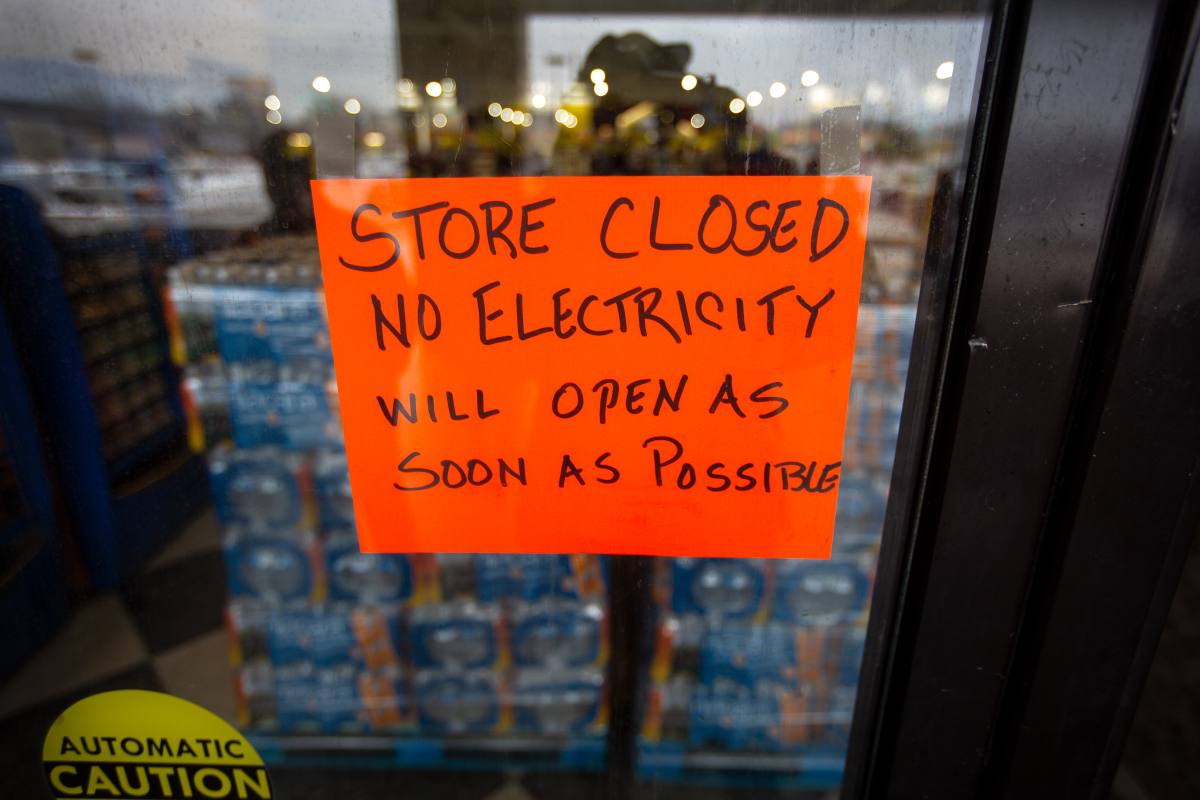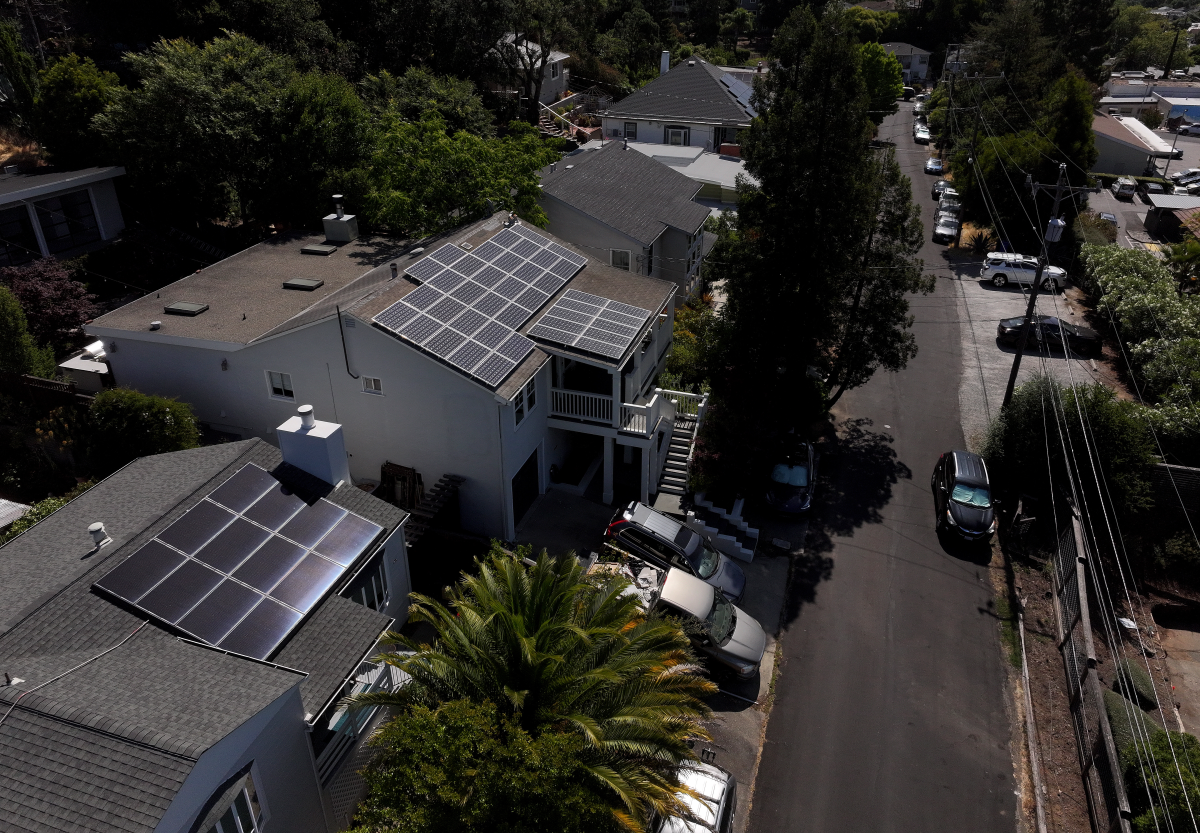After Spain’s blackout, critics blamed renewable energy. It’s part of a bigger attack
Last spring, tens of millions of people lost electricity across Spain, Portugal and part of France. Trains stopped in their tracks, and people were stuck in elevators, as southwestern Europe went without power for — in some cases — more than ten hours.
Immediately the finger-point began. Many people blamed solar and wind energy. Spain, one of Europe’s front runners in renewable energy, gets about 46% of its power from solar and wind, according to the think tank Ember— sometimes more than 70%.
In the hours after the outage The Daily Mail published the headline “Could renewable energy be to blame for huge Spain blackout?”
And on the day of the outage U.S. energy secretary and former fracking executive Chris Wright went on CNBC to talk about the outage and criticized solar and wind. “When you hitch your wagon to the weather,” Wright said, “it’s just a risky endeavor.”
The idea that solar and wind are inherently risky and unreliable is a common talking point for critics of renewable energy, often repeated by groups with ties to the fossil fuel industry. It’s false. When renewable energy is paired with large batteries or other forms of grid management, it’s proven to be reliable.
Now a new report from an expert panel of European grid operators details what happened. The report finds that for the first time in Europe, a voltage surge caused the massive outage. Voltage needs to remain within limits for an electrical grid to work. While many things went wrong, the problem was not a power grid with too much wind or solar, says Chris Rosslowe, a senior energy analyst at Ember who was not involved in drafting the report.
“It contradicts the numerous claims that we’ve seen that an overreliance on renewables was the cause,” Rosslowe says. “That is clearly not true.”
But the misinformation about solar and wind energy causing the outage has had an impact. A new survey found that a majority of Spanish respondents believe at least one false narrative about the blackout, and the most common was that too much reliance on renewable energy was to blame.
Countries around the world are using renewable energy to move away from polluting fossil fuels. That’s why it’s so important to counter false narratives about solar and wind, says Philip Newell, communications co-chair of the Climate Action Against Disinformation, a coalition of nonprofits.
“This content makes it seem more normal and feel more normal to hate on renewables,” Newell says. “Even though they’re a solution to climate change.”

What did happen before the outage
The new report from the European grid operators’ expert panel found multiple triggers shortly before the blackout.
First, oscillations, or sudden swings in power flow, hit the grid. It’s still unclear what caused them. Spain’s main grid operator took steps to control the oscillations, including sending less power to France. While these actions helped dampen the oscillations, they caused the voltage to surge upwards.
Voltage is like pressure in a water system. Just like it’s key to have a certain amount of pressure for water to flow, there needs to be a certain amount of voltage to push electrons through a circuit. But voltage can’t be too high, or it can cause short circuits or even fires.
When the voltage surged, transformers and power plants shut down. Antonio Gómez-Expósito, electrical engineering professor at University of Seville, says the outage shows that Spain needs more regulations around controlling voltage.
The expert panel report, like other recent analyses from Spain’s government and main grid operator, does not indicate that reliance on solar or wind power led to the outage. The panel will issue a final report next year.
Newell says the immediate accusations against renewable energy didn’t surprise many people who study attacks on climate solutions. “We’ve known this has been a recurring issue,” Newell says. “The big frame is that ‘renewables are bad and we can’t trust them’.”
Renewable critics said blackout was caused by lack of “inertia” – it wasn’t
When critics of renewable energy pointed the finger at solar or wind for causing the blackout, many used one word: inertia.
Michael Shellenberger, a longtime critic of renewable energy and proponent of nuclear power with 1.4 million followers on X, said in a post the day of the blackout, “Renewables don’t risk blackouts, said the media. But they did and they do… it’s clear that too little ‘inertia’ due to excess solar resulted in system collapse.”
Inertia is important to the electrical grid because it can help stabilize sudden fluctuations in a grid’s frequency. Power plants that run on gas, coal or nuclear use large spinning turbines that create electricity and have inertia. More modern power resources, like wind, solar, and batteries, don’t involve inertia, because they are digitally controlled. “Wind and solar plants either have no inertia or very little,” Gómez-Expósito says, “but in return, they have infinitely greater response speeds.”
There is no indication that a lack of inertia was the cause of the outage, Gómez-Expósito says. Spain’s main grid operator, Red Eléctrica, released a report about the outage this summer. “The incident was not caused by an inertia problem,” it said in a press release.

Renewable misinformation has an impact
False claims that too much reliance on solar and wind caused the blackout in Spain and Portugal fit into broader attacks on renewable energy.
In winter 2021, a massive power outage hit Texas. Investigations ultimately found that the outage’s cause was gas and coal plants that were forced offline because of freezing temperatures. But critics of renewable energy blamed solar and wind, says Timmons Roberts, professor of environmental studies and sociology at Brown University.
”In 2021, again, there was uncertainty on what caused it, but immediately there were attacks on renewable energy,” Roberts says. “ Sort of exploiting, taking advantage of a crisis to make unfounded accusations.”
Shortly after the power went out in Spain, Newell and his team from the Climate Action Against Disinformation Coalition decided to do a survey about false narratives in the blackout’s wake. They surveyed 1,200 people in Spain and 1,200 in the United Kingdom – because many in the U.K. were also paying attention to the outage.
They found seven in ten in Spain and six in ten in the U.K. fell for at least one false narrative about the blackout causes. The most commonly believed false narrative was that the reliance on renewables was at fault.
Newell says while most of the survey respondents acknowledge the reality of climate change, misinformation led many to question the reliability of renewable energy.

Renewable energy plus batteries proving to be reliable in warming world
Solar and wind resources are already proving to be part of a reliable grid, says Elliot Mainzer, chief executive of the California Independent System Operator, which assures the reliability of California’s grid. California was powered by two-thirds clean energy in 2023, the latest year for which data is available.
Mainzer says the key is pairing solar and wind energy with massive batteries. Batteries are especially important with solar, as they absorb excess solar energy during the day, and send it back into the grid after the sun sets and evening demand stays high, Mainzer says.
Mainzer says older power sources have their own problems. California faces a loss of hydropower during droughts. And Mainzer says, gas power plants have some reliability challenges, too.
“ During the kind of heat waves we’ve seen in recent years, the natural gas plants can come under some significant strain,” Mainzer says. “They have to run harder, they mechanically get challenged, and we tend to see a higher outage rate amongst the gas fleet when the temperatures are really, really hot.”
Mainzer says the use of solar plus batteries helped prevent blackouts in California in 2022 when there was a heatwave hitting much of the state and gas plants were under performing. Texas’ main grid operator, ERCOT, has also said that an increase in solar and battery storage has helped the state avoid power outages — especially as the state sees unexpected outages with coal plants.
As the planet sees longer and more intense heat waves with global warming, primarily caused by humans burning fossil fuels, Mainzer says solar combined with batteries, both of which perform well in the heat, will be important to keep the lights on.
Transcript:
MARY LOUISE KELLY, HOST:
When a massive power outage hit Spain and Portugal last spring, there were all kinds of rumors about the cause. Now the findings of an expert panel are out, and the report contradicts one big line of misinformation, as NPR’s Julia Simon reports.
JULIA SIMON, BYLINE: In the hours and days after the outage, there was a lot of finger-pointing – it was a cyberattack. It was Russia.
CHRIS ROSSLOWE: Well, almost immediately, theories started circulating.
SIMON: Chris Rosslowe is an energy analyst with the think tank Ember.
ROSSLOWE: It wasn’t a good time for getting to the truth.
SIMON: For many people, there was one prime suspect – solar and wind power. Spain, a leader in renewable energy, gets about 46% of its power from solar and wind, according to Ember. Sometimes more than 70%. On the day of the blackout, U.S. Energy Secretary Chris Wright went on CNBC and criticized renewables.
(SOUNDBITE OF ARCHIVED RECORDING)
CHRIS WRIGHT: You know, when you hitch your wagon to the weather, it’s just a risky endeavor.
SIMON: But a new report from an expert panel of European grid operators does not implicate renewables. It finds a surge in voltage caused the massive outage. Voltage needs to be within limits for an electrical grid to work. While many things went wrong, the problem was not a grid that’s overreliant on wind and solar, says Antonio Gomez-Exposito, electrical engineering professor at University of Seville.
ANTONIO GOMEZ-EXPOSITO: (Speaking Spanish).
SIMON: “The problem isn’t whether there are too many renewables,” he says. Reports on the outage from Spain’s government and main grid operator echo this point. Gomez-Exposito says he thinks Spain needs more regulations around voltage.
The idea that solar and wind are inherently risky is a common narrative of critics, many tied to the fossil fuel industry. It’s false. When renewable energy is paired with large batteries or other forms of grid management, it’s proven to be reliable. Still, in Spain, the misinformation had an impact. A new survey finds 7 out of 10 Spanish respondents believe at least one false narrative about the outage. The most common? A grid with too much renewable energy was to blame.
Philip Newell is communications co-chair of Climate Action Against Disinformation, the coalition of nonprofits that commissioned the survey. False narratives against solar and wind, he says, are a recurring issue.
PHILIP NEWELL: This content makes it seem more normal and feel normal to hate on renewables. And the big frame is that renewables are bad and we can’t trust them.
SIMON: Newell says it’s important to counter this misinformation as countries around the world increasingly use renewable energy to move away from planet-heating fossil fuels. Grid operators from Texas to Australia are finding that renewables plus batteries are cost-effective and stable. Elliot Mainzer is chief executive of the California Independent System Operator, which assures the reliability of California’s grid. He says solar plus batteries helped prevent blackouts in 2022, when a heat wave hit California and gas plants were underperforming.
ELLIOT MAINZER: Especially during the kind of heat waves we’ve seen in recent years, that the natural gas plants can come under some significant strain. They have to run harder. They mechanically get challenged. And we tend to see a higher outage rate amongst the gas fleet when the temperatures are really, really hot.
SIMON: As the planet sees longer and more intense heat waves with global warming, Mainzer says solar, combined with batteries, will be important to keep the lights on. Julia Simon, NPR News.
(SOUNDBITE OF FUGEES SONG, “READY OR NOT”)
In this Icelandic drama, a couple quietly drifts apart
Icelandic director Hlynur Pálmason weaves scenes of quiet domestic life against the backdrop of an arresting landscape in his newest film.
After the Fall: How Olympic figure skaters soar after stumbling on the ice
Olympic figure skating is often seems to take athletes to the very edge of perfection, but even the greatest stumble and fall. How do they pull themselves together again on the biggest world stage? Toughness, poise and practice.
They’re cured of leprosy. Why do they still live in leprosy colonies?
Leprosy is one of the least contagious diseases around — and perhaps one of the most misunderstood. The colonies are relics of a not-too-distant past when those diagnosed with leprosy were exiled.
This season, ‘The Pitt’ is about what doesn’t happen in one day
The first season of The Pitt was about acute problems. The second is about chronic ones.
Lindsey Vonn is set to ski the Olympic downhill race with a torn ACL. How?
An ACL tear would keep almost any other athlete from competing -- but not Lindsey Vonn, the 41-year-old superstar skier who is determined to cap off an incredible comeback from retirement with one last shot at an Olympic medal.
Trump promised a crypto revolution. So why is bitcoin crashing?
Trump got elected promising to usher in a crypto revolution. More than a year later, bitcoin's price has come tumbling down. What happened?






